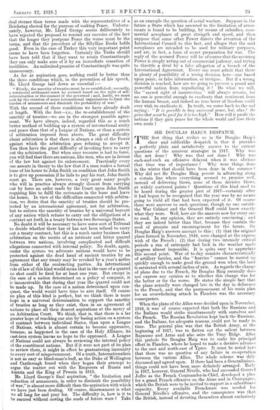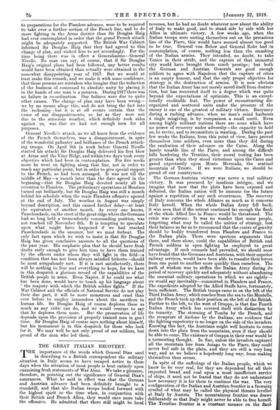SIR DOUGLAS HAIG'S DESPATCH. T HE first thing that strikes us
in Sir Douglas Haig's clear and soldierlike despatch is that it provides a perfectly plain and satisfactory answer to the current questions of the amateur strategist in 1917. Why was this not done ? Why was that not done ? Why was such-and-such an offensive delayed when it was obvious that time was of importance ? Why were things done in the winter that should have been done in the summer ? Why did not Sir Douglas Haig persist in advancing along a certain line where everything seemed to promise well, instead of delivering blows, none of them decisive blows, at widely scattered points ? Questions of this kind used to be heard during the greater part of 1917—certainly after it had begun to be recognized that the year was by no means going to yield all that had been expected of it. Of course there were answers to such questions, though no one outside the War Cabinet and the General Staff could know exactly what they were. Well, here are the answers now for every one to read. In our opinion, they are entirely convincing ; and they are indeed better than that, because they contain the seed of promise and encouragement for the future. Sir Douglas Haig's answers amount to this : (1) that the original plans formed in November, 1916, were changed at the express wish of the French ; (2) that during two intensely critical periods a run of extremely bad luck in the weather made progress almost impossible. It is quite easy to appreciate this second point. War of to-day consists characteristically of artillery battles, and the " heavies " cannot be moved up quickly enough to make good the ground won when the land is saturated with several inches of rain. As regards the change of plans due to the French, Sir Douglas Haig naturally does not express any opinion as to whether this change was for the better or for the worse. He states the simple fact that the plans actually were changed late in the day in deference to the French, and that the postponement of his main plan for an overwhelming attack in Flanders was the necessary consequence.
When the plans of the Allies were decided upon in November, 1918 it was of course expected that both the Russians and Italians talians would strike simultaneously with ourselves and the French. The Russian Revolution kept back the Russians, and the Italians, for adequate reasons, could not be ready in time. The general plan was that the British Army, at the beginning of 1917, was to flatten out the salient between Bapaume and Arras and also seize the Vimy Ridge. After this prelude Sir Douglas Haig was to make his principal effort in Flanders, where he hoped to make a decisive advance to the east and north-east of Ypres. It must be noted here that there was no question of any failure in co-operation between the various Allies. The whole scheme was duly discussed and agreed upon. If there had been a Generalissimo, things could not have been more definitely arranged. Early in 1917, however, General Nivelle, who had succeeded General Jere as the French Commander-in-Chief, developed a plan for a grand French offensive on the Aisne and in Champagne, which the British were to be invited to support in a subordinate capacity. Every available Frenchman was needed for General Nivelle's offensive, and the consequence was that the British, instead of devoting themselves almost exclusively to preparations for the Flanders advance, were to be required to take over a further section of the French line, and to do more fighting in the Arras district than Sir Douglas Haig had ever contemplated in order that the grand French attack might be adequately supported. The British War Cabinet informed Sir Douglas Haig that they had agreed to this change of plan, and wished him to act accordingly. For the time being there was in effect a Generalissimo—General Nivelle. No man can say, of course, that if Sir Douglas Haig's original plans had been followed, any better results would have been obtained than actually were obtained in the somewhat disappointing year of 1917. But we would at least make this remark, and we make it with some confidence, that those persons are mistaken who imagine that the reduction of the business of command to absolute unity by placing it in the hands of one man is a panacea. During 1917 there was no failure in co-ordination. Our failures were due to quite other causes. The change of plan may have been wrong— we by no means allege this, and do not bring the fact into the reckoning—but it is at all events certain that the cause of our disappointments, so far as they were not due to the atrocious weather, which definitely took sides against us, was that we had not enough men for all purposes.
General Nivelle's attack, as we all know from the evidence of the French themselves, was a disappointment, in spite of the wonderful gallantry and brilliance of the French attack- ing troops. On April 9th (a week before General Nivelle started his attack) Sir Douglas Haig delivered his first blow at Arras and the Vimy Ridge, and within two days took every objective which had been in contemplation. For five weeks more he went on fighting along that line, not in order to reach any particular point, but in order to give special support to the French, as had been arranged. It was not till the middle of May—a month later than the date agreed in the beginning—that Sir Douglas Haig devoted nearly all his attention to Flanders. The preliminary operations at Messina turned out brilliantly, but Sir Douglas Haig was still a month behind his schedule when the main Flanders offensive opened at the end of July. The weather in August was simply beyond description, and this caused further delay—at least the equivalent of another month. As every one knows, Passchendaele, on the crest of the great ridge where the Germans had so long held a tremendously commanding position, was not reached till November 6th. It is tempting to speculate upon what might have happened if we had reached Passchendaele in the summer, but we must forbear. The only fact upon which we wish to insist is that Sir Douglas Haig haS given conclusive answers to all the questions of the past year. His emphatic plea that he should have fresh drafts early enough to give him time to have them trained by the officers under whom they will fight in the field—a condition that has not been always satisfied hitherto—should be most scrupulously met. If it is met satisfactorily, there will be nothing to fear and everything to hope, for we have in this despatch a glorious record of the capabilities of the British people in arms. Even Napier, if he could see what has been done, would have to touch up his language about the majesty with which the British soldier fights." If the War Cabinet and the officials of National Service do not play their due part, it will be more monstrous and cruel than ever before to employ innuendoes about the sacrifices in human life. Sir Douglas Haig of course deplores these as much as any critic can do, and we would venture to say that he deplores them more. But the preservation of life depends upon the provision of properly trained men in goo 1 time. Sir Douglas Haig of course says nothing about himself, but his monument is in this despatch for those who .look for it. We may well be not only proud of our soldiers, but - proud of the man who led them.



























 Previous page
Previous page